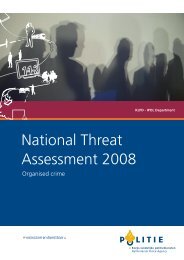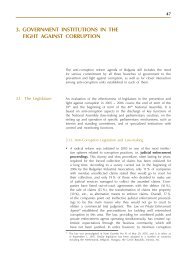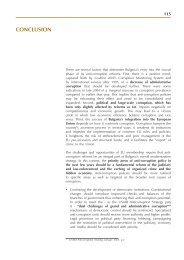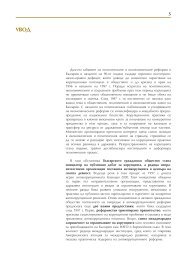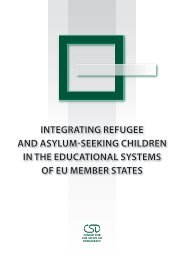5. Civil Society against Corruption (PDF, 293 kb)
5. Civil Society against Corruption (PDF, 293 kb)
5. Civil Society against Corruption (PDF, 293 kb)
Create successful ePaper yourself
Turn your PDF publications into a flip-book with our unique Google optimized e-Paper software.
106 ANTI-CORRUPTION REFORMS IN BULGARIA<br />
Open Government Initiative Project<br />
The Open Government Initiative (OGI) project is implemented in<br />
Bulgaria by DPK Consulting with funding from the United States<br />
Agency for International Development (USAID) and covers activities<br />
related to institutional capacity building, prevention of corruption,<br />
enhancing the transparency and accountability, and reinforcing the<br />
rule of law, particularly in the areas of public sector auditing and<br />
public procurement.<br />
OGI supports the efforts of civil society to enlist broader public<br />
participation in the fight <strong>against</strong> corruption and encourages<br />
cooperation with state institutions, the media, and the private<br />
sector. Since the outset of the project, there have been three calls<br />
for proposals for anti-corruption projects with fourteen projects of<br />
civic organizations implemented in 2003 and 2004.<br />
<strong>5.</strong>1.1. Public-Private Partnership<br />
Public-private partnerships were not the most obvious choice of going<br />
about anti-corruption reforms in 1997, and not only in Bulgaria. Bulgarian<br />
non-governmental organizations could be credited for managing to engage<br />
government in an area that was not only sensitive but also required<br />
considerable commitment of will and resources. Eight years later it<br />
could be safely said that cooperation between the civil sector and<br />
government is as a major prerequisite for successful anti-corruption<br />
reforms. At the same time, the interaction between state and civic<br />
organizations involves a number of inherent strains.<br />
Anti-corruption initiatives and efforts launched by NGOs in Bulgaria<br />
continued to face an essentially ambivalent attitude on the part of the<br />
state. Since corruption came on the agenda, governments have wavered<br />
between the aspiration to identify with the values of transparency<br />
and integrity, on the one hand, and the reluctance to publicly<br />
acknowledge corruption, particularly at its higher ranks, on the other.<br />
The inconsistent anti-corruption efforts and the discrepancy between<br />
political rhetoric and actual policies contributed to the alienation between<br />
government and the public. Among other things, this has enhanced the<br />
need for greater role of NGOs in anti-corruption.<br />
Attitudes in parliament towards corruption were equally marked by<br />
ambivalence as the parliamentary bodies, trusted with tackling it, could<br />
not incorporate anti-corruption priorities in the agenda setting of the<br />
legislature. This adversely affected the anti-corruption cooperation<br />
between governing majorities and non-governmental organizations.<br />
Another factor undermining public-private partnerships has been<br />
partisanship. Political parties and politicians frequently tried to present<br />
a better public image by associating with NGO anti-corruption efforts.



